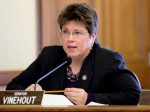Special Education Vouchers Raise Concerns
Plan hatched in secret. Law is long and complex. Vote was speedy and partisan. Results?
“When you write about tax money going to private schools, please tell people about special education vouchers,” a rural school board member told me. “Because of a change in state law, our school district is paying for special education students to sit at home in front of a computer.”
October is budget time for school districts. The rural school board member just saw the new budget and learned of the high cost for special needs students who are now attending an online school with $12,000 per student of school funds. The school board member asked that I not mention the district or his name to protect the privacy of local students.
The story of how school districts are paying private or online schools $12,000 per special needs student with little guarantee to parents or taxpayers of the quality of that education reads like a litany of everything wrong with state government.
The plan originated in secret. A budget amendment was made available to the public well after midnight. The vote was speedy and partisan. The document was long and complex. Many other controversial actions were included in the same amendment. The motion passed in the wee hours of the morning. Few paid attention to the details related to special education vouchers and open enrollment.
Late last May, GOP leaders introduced a 29-page amendment to the state budget. One of the provisions, scheduled to go into effect this September, allowed special education students to attend private schools with a $12,000 public subsidy. Another provision nearly doubled the cost of open enrollment for a special education student and barred the child’s home school district from stopping the transfer due to financial reasons.
The latter provision opened the door for local special education students to attend on-line schools like “Wisconsin Virtual Academy.”
However, press attention at the time focused on controversial changes like allowing persons without a college degree to be public school teachers or forcing public schools to accept private school students on their athletic teams. Much attention focused on the plans to take control away from the Milwaukee School Board.
A group called “Stop Special Needs Vouchers” made up of concerned parents worked against the plan. These parents raised critical questions about sending tax money to private schools. They saw risks for students who attended private schools and a drain on sorely needed resources for students who stayed in public schools.
The group warned parents that children in a private school would lose rights and protections under federal law. Special education students are guaranteed needed services. Services might include speech therapy, assistance from a reading specialist, or occupational therapy. Private schools are not required to hire special education teachers or therapists. Nor are they required to follow a student’s Individualized Education Plan.
The families of “Stop Special Needs Vouchers” warned legislators that taking $12,000 per student away from public schools meant less money would be available for special needs students who remained in the district.
I spoke with one local superintendent whose district loses $12,000 per special education student but only received $2,400 in state aid per student. The district’s money goes to Wisconsin Virtual Academy. WVA is operated by K12, Inc. a publicly traded company co-founded by William Bennett former Secretary of Education under President Reagan.
With so much money leaving a district through a variety of private school subsidies, it is hard to balance the budget.
“Why are schools going to referenda? To survive,” the superintendent told me.
Superintendents and school board members are worried the move to isolating special needs children in special schools or virtual schools changes forty years of policy to educate special needs students in the least restrictive environment.
“The biggest problem is that the kids aren’t getting much in terms of education,” said the rural school board member. “The special education student is going to suffer the rest of their lives because of a poor education.”
Sen. Kathleen Vinehout, D-Alma, is a member of the Wisconsin state Senate.
Op-Ed
-
Wisconsin Candidates Decry Money in Politics, Plan to Raise Tons of It
 Dec 15th, 2025 by Ruth Conniff
Dec 15th, 2025 by Ruth Conniff
-
Trump Left Contraceptives to Rot; Women Pay the Price
 Dec 8th, 2025 by Dr. Shefaali Sharma
Dec 8th, 2025 by Dr. Shefaali Sharma
-
Why the Common Council’s Amended Budget is Good Policy for Milwaukee
 Nov 20th, 2025 by Alds. Marina Dimitrijevic and Russell W. Stamper, II
Nov 20th, 2025 by Alds. Marina Dimitrijevic and Russell W. Stamper, II























Wisconsin Virtual Academy is not a private school. It is a public charter school. It is a flawed premise to present the case that $12,000 per student is going to private schools and then only mention WIVA (not WVA) as an example when it isn’t a private school at all.
Well, the vouchers are doing exactly what the Republicans want, putting our tax dollars in the hands of for profit private schools. It’s one more step in their goals of privatizing all of government and silencing the peoples’ voice once and for all. Next we end up a dictatorship and not even the Republicans will have a voice. They will never see it coming because they refuse to think their actions through to the end result.